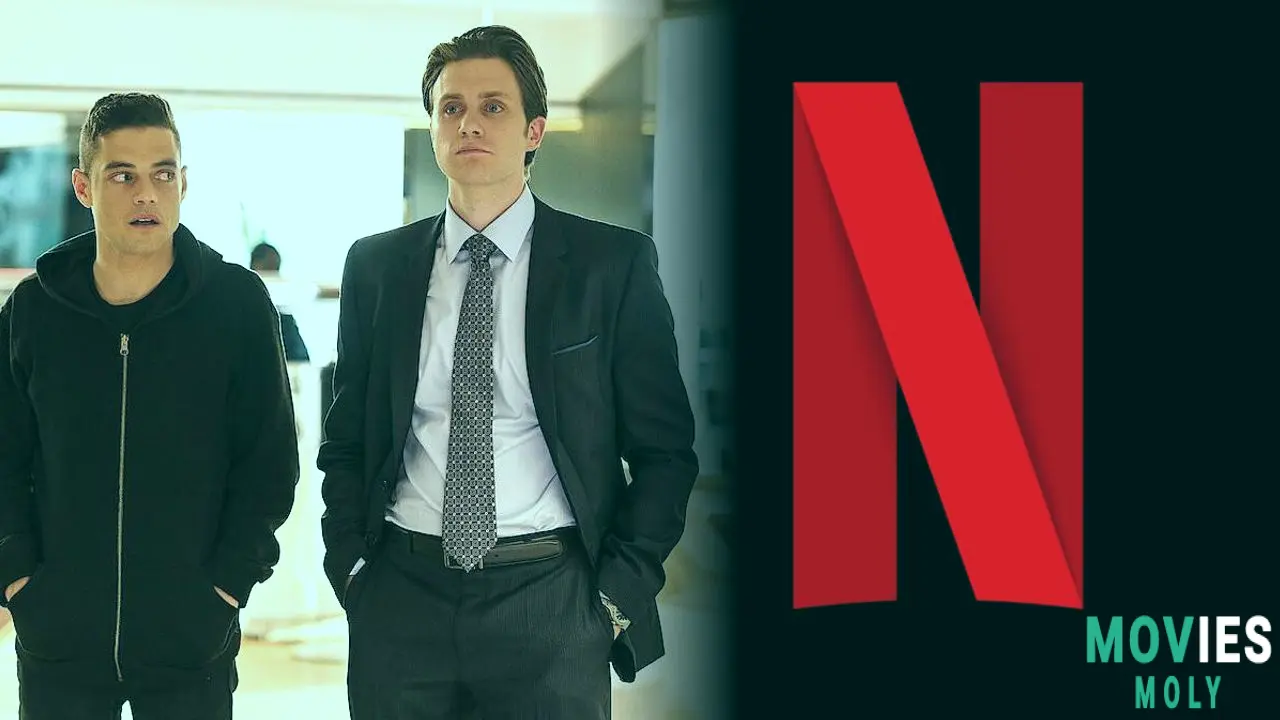The first time Mr. Robot made my skin crawl will always stay with me. Not because of the scary hacking scenes or Christian Slater's crazy grins, but because of a phrase from the pilot episode in 2015: "We live in a world where a conglomerate like E Corp can hack entire populations." Ten years later, as I binge all four seasons that were just available on Netflix, Elliot Alderson's paranoid rants sound less like conspiracy and more like news stories. Sam Esmail's cyber-thriller didn't only show us how bad things may get; it also gave us a plan to fight back.
Elliot Alderson is the last real antihero on TV, and we're still trying to catch up to him.Rami Malek's career-defining role holds together a world that is falling apart.
First things first: Rami Malek's Elliot Alderson is more than simply a character; he's a cultural earthquake. Years before "burnout" became a phrase, those haunted eyes peeking out from under a hoodie became the face of Gen Z's digital disenchantment. But here's the fact that the Emmys didn't get: Elliot's dissociative episodes, social anxiety, and morphine-induced reality checks are not just strange. They are the direct result of living in a world that makes money off of human connection while eliminating real humanity.
Esmail's brilliance shines through in how Elliot's mental health is connected to the show's hacking ideology. When Elliot whispers to a hacked child predator, "I don't want your money; I want your chaos," it's not simply vigilante justice; it's the desperate cry of someone using the system's own tools against it. We're not seeing a hacking thriller during the heart-stopping one-take hotel siege in Season 4. We are seeing a man fight his own broken mind in a guerrilla war.
The Revolution Won't Be Streamed, But It Might Get Views on TikTok

How Mr. Robot Saw Our Algorithmic Nightmare Coming
Watching fsociety's 2015 manifesto again now is like finding a crystal ball in a server farm. Their anger at "the guys who play God without permission" can now be heard in every anti-Musk tweet and AI ethics panel. But here's what most reviews don't say: The show's real foresight isn't in anticipating crashes in cryptocurrency or ransomware outbreaks; it's in showing how technology would change who we are.
Take a look at the nuclear plot in Washington Township in Season 3. Ten years before ByteDance lobbyists stormed Capitol Hill, Esmail illustrated how foreign governments were using American data centers as weapons. The "virtual reality" Elliot fights aren't like a new Matrix movie; they're the dystopia we see on Instagram every day. In our ChatGPT era, when billionaires chase digital utopias while real cities burn, Whiterose's fascination with quantum computers seems all too familiar.
Sam Esmail's Visual Rebellion: A Middle Finger to Peak TV Norms

Why You Should Give That Controversial Season 2 a Second Chance
Yes, season two is slow. Yes, the prison twist made people puzzled. That doesn't matter because Mr. Robot was never designed to be talked about over the watercooler every week. Esmail's Kubrickian framing, with its suffocating ceiling shots and whispers that shatter the fourth wall, makes you want to watch all at once. In 2016, it felt like a sitcom parody that was too self-indulgent. Really? Now it seems like a visionary pushing the limits of streaming before Netflix had the guts to do it.
The single-take riot episode ("eps3.4_runtime-err0r.r00") that everyone hates isn't just a technological show-off. It's the perfect way to describe how we keep scrolling past institutions that are falling apart, like healthcare, money, and even democracy. And that Fight Club homage that some said was not original? As Zuckerberg sells cage fights, Meta's stock drops, which is sadly ironic.
The Last Hack: Changing Its Own History

Why 2024 Is The Best Year For A Mr. Robot Comeback
The best part of the series finale isn't the twist that turns everything upside down; it's how it changes the way we see Elliot's whole journey. Darlene's last speech in 2019 made me feel hopeful. Her words hurt in a different way today: "This only works if you let go too." AI deepfakes are affecting elections, and CEOs are pushing for a "reset" of the internet.
Now that I've seen the whole series, I'm impressed by how Elliot's combat against E Corp is like the wars we fight against Apple's monopolies and OpenAI's data scraping. The "wealth redistribution" that fsociety pushed for? It's like Bernie Sanders' 2024 platform and the pandemonium on Reddit's WallStreetBets. In this time of "hustle porn" and crypto frauds, even Tyrell Wellick's sociopathic rise through the business world seems like it will happen.
Mr. Robot has the nerve to say that accepting what makes us human is the only way to save our souls.
Esmail's other works, including Leave the World Behind, play with the idea of the end of the world, but Mr. Robot is still his most important work because it teaches us how to ask the correct questions. As algorithms take over more and more of our lives, Elliot's last warning to "control the narrative" seems less like a hacker's manifesto and more like our last survival guide.
You can now watch all four seasons of Mr. Robot on Netflix. Episodes last from 43 to 65 minutes, which is excellent for a weekend revolution.




